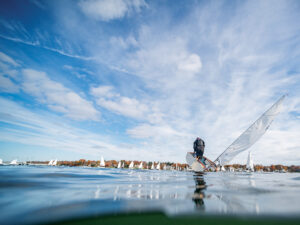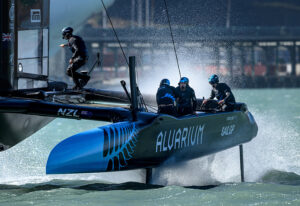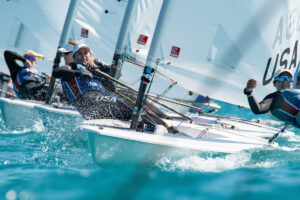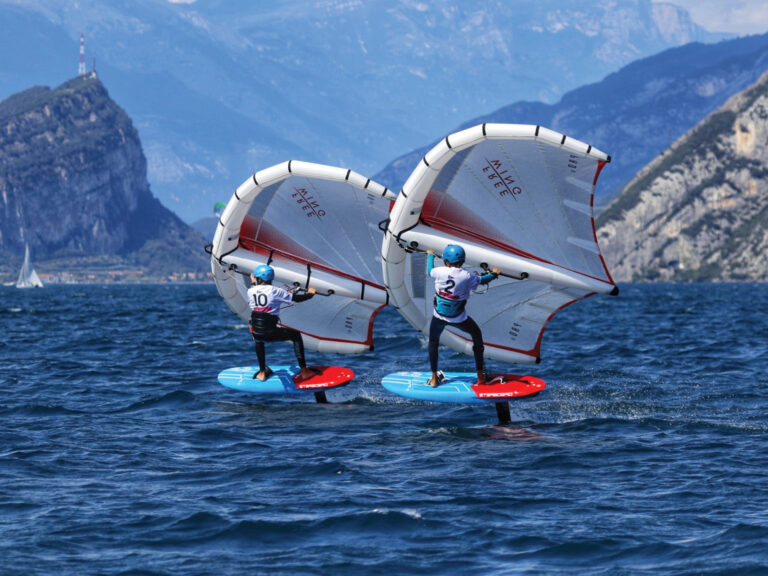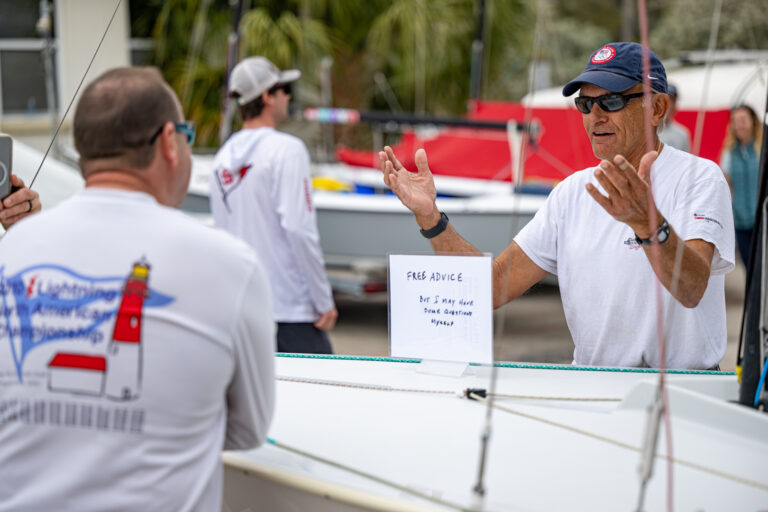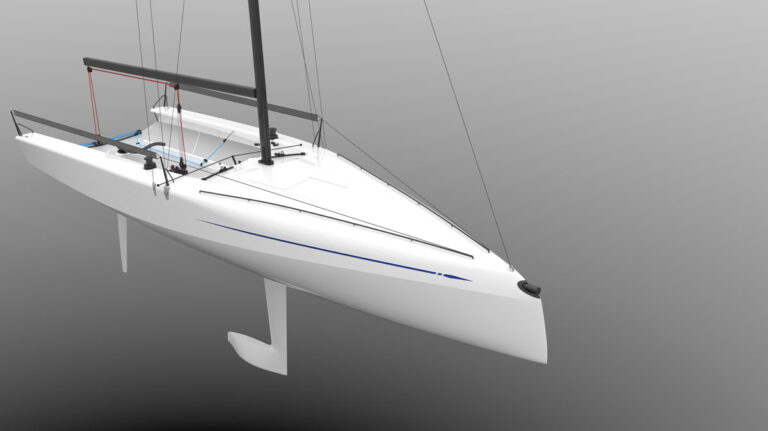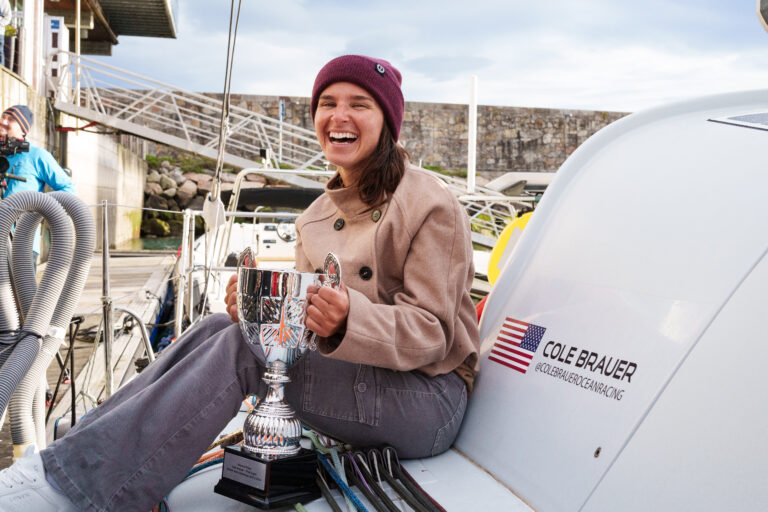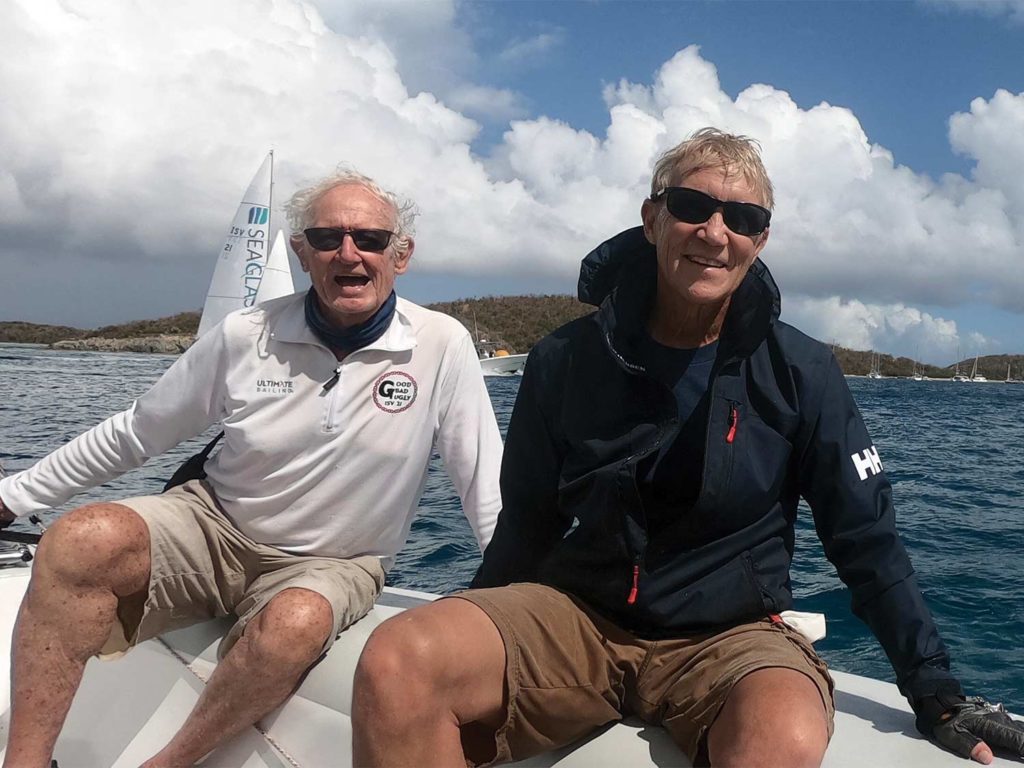
In more than 60 years of sailboat racing, John Foster has never fallen off a boat, but let’s just say that the 83-year-old Virgin Islander is always willing to try new things.
Foster and I are paired up for the 2021 St. Thomas International Regatta. We’re racing an IC24, the local one-design class, which is essentially a J/24 hull updated with a sportboat cockpit. Normally, you’d race an IC24 with four to five crew, but due to social distancing restrictions, we’re racing three-up, using a smaller COVID-19 jib to reduce sail area.
Here in St. Thomas, the IC24 racecourse is wreathed by coral heads and moored boats, which gives the races a kind of college-sailing intensity, where starts are premium and shifts come hard and fast. The course’s right side is favored and the starting line crowded, so we decide to use the old Waikiki special for the starts: Approach late at the race-committee-boat end and tack as soon as possible to get clean air. With a coral reef limiting a more traditional approach from the starboard side of the starting line, however, executing this move means approaching late on port and above the line. This strategy, of course, requires a hairpin jibe within a minute of the start.
It’s all good in theory, but our approach backfires in the fourth race of the regatta, when, 90 seconds before the starting gun, we accidentally spin out of control and into a tack, causing Foster to slip off the low side into the teal-blue water.
“Man overboard!” I yell and grab the helm, putting us straight into a man-overboard drill. Having coached adult sailing for many years, I normally do this exercise by tossing a life jacket in the water as a dummy. With a living person, the maneuver is no different, though the stakes are much higher. We weave a tight figure eight, tacking once on our way back to Foster, where we luff up on port and guide him to the transom swim ladder.
Meanwhile, a dozen IC24s have started the race and are barreling toward us. I wave my arms and yell as loud as possible to make sure they know we are in distress. After getting Foster back into the boat, I think surely we are finished for the race, if not the day. But when I ask my sopping skipper if we are still racing, he replies without hesitation: “Hell yeah, we’re racing. Grab the mainsheet!”
With that, we dip the line and make our way upwind in 25 knots, Foster hooting and hollering as we eventually reel in four boats before the finish.
“I’ve never watched the start from in the water,” he says jokingly. “So, I figured, why the hell not?”
“John is not a normal human being,” says Bobby Weinstein, our third crew and jib trimmer. “He got COVID-19 at 83 years of age and barely had any symptoms. He’s been to the Olympics six times, and when you talk to him, it’s like talking to an 18-year-old. And he knows everyone. You could spin a globe and plant your finger anywhere in the world, and John wouldn’t only have been there, he would have a friend there.”
In many ways, Foster has lived a life of mythic proportions. Born in Wallasey, England, in 1938, he learned to sail on the River Mersey in Liverpool. As a teenager, he sneaked into bars with two young musicians named John Lennon and Paul McCartney—that is, until his parents decided that Lennon was a negative influence and banned them from seeing each other. The son of an RAF pilot, Foster completed his military conscription in the 1950s as a midshipman in Her Majesty’s Royal Navy on an aircraft carrier, HMS Bullwark, testing some of the world’s first nuclear submarines in the North Sea.
In 1961, he was commissioned to deliver a ketch to St. Thomas in the US Virgin Islands, where he would end up calling home for the rest of his life. “When you’re at sea, you never know what’s going to happen,” Foster says. “You sail into a harbor somewhere, and all hell breaks loose.”
When he got to St. Thomas, he had no plan of staying, but within a few weeks, he says, he was “dating a really nice young woman,” and landed a job at a bed-and-breakfast. Foster would end up marrying that same woman, his late wife Claire, with whom he had two children and six grandchildren. He started a real estate business and bought the bed-and-breakfast, turning the establishment into a thriving hotel that he still owns today. In 1964, he and his buddies founded the St. Thomas YC as charter members, with Foster picking out the property himself. They turned a section of Cowpet Bay, on St. Thomas’ east side, from a tangle of mangroves into one of the Caribbean’s most iconic racing venues. From this little harbor, Foster would eventually make the leap from beach bum to Olympic athlete.
The US Virgin Islands was granted an Olympic berth before the 1968 Games, Foster says. “By the time 1972 rolled around, everyone was just getting into the Tempest class, so I got a boat and got involved.”
In those early Tempest days, Foster competed against the likes of Dennis Connor and Ted Turner, but after the 1976 Olympic regatta, the Star class was where the action was. Foster followed suit. “All the big names went back to the Star class,” he says. “It was some of the most competitive racing I’ve ever done.”
Eventually, Foster’s son, Johnny, became his crew, and the father-son tandem competed in three Olympic cycles together—1984, 1988 and 1992. “Making it a family sport at that level meant the world to me,” Foster says. “Being able to compete with my son against the best sailors in the world—it doesn’t get any better.”
The St. Thomas YC, meanwhile, was fast becoming a hub of international sailing. In 1972, Foster helped promote an annual regatta by going around Cowpet Bay in his dinghy, knocking on boats and handing out fliers. After a few years of growth, the regatta secured sponsorship through eventual Rolex USA CEO Walter Fischer, who at the time was just starting out with a little Rolex shop on the island. Like Foster, Fischer eventually served as commodore of the club, and together they developed their little annual gathering into the St. Thomas Rolex Regatta. It was the first event to pair sailboat racing with the sport’s most enduring sponsors. Rolex’s cache, and the caliber of the sailing venue, drew boats from all over the world, establishing a level of internationalism that fueled its growth. “The camaraderie between nations is really what it’s all about,” Foster says. “At the Olympics in Kiel [Germany], I was able to meet a lot of sailors from behind the Iron Curtain who normally weren’t allowed to meet anyone. But in the Olympic Village, everyone was equal. There were no geopolitical issues at stake. It was all just sailing. The same thing applies for our regatta here in St. Thomas. When you’re down here, we want to make you feel at home.”
Foster has won virtually every regatta on the Caribbean circuit, enjoying a diverse island lifestyle that once included a job as Royal Navy liaison officer. He welcomed British naval ships into the islands, which eventually granted him an audience with Queen Elizabeth and Prince Phillip on the Royal Yacht in St. Kitts. “Prince Phillip had loads of questions about Caribbean sailing,” Foster says. “He was really a great guy, when you got to talking to him.”
Foster also seized an opportunity for another Olympic venture outside of sailing. In 1988, he created the first bobsled team from any Caribbean nation, competing in the Calgary Winter Olympics, an effort that was followed up by a Jamaican team, whose story was captured in the film Cool Runnings.
“Compared with the more-established teams, none of us really knew what we were doing,” Foster says. “The East Germans particularly hated us. They complained that we were messing up the tracks and that they wouldn’t be able to set their world records. They even tried to have us race separately, but the Olympic Committee overruled their motion.”
While in Calgary, Foster visited a trophy shop and bought a silver goblet that he dubbed the Caribbean Cup, to be raced for by the warm-weather nations, which included Jamaica, Mexico, Monaco, the Netherland Antilles and New Zealand. Foster wasn’t upset when the Kiwis eventually won because, for him, winning races comes second to having fun.
“You’ve got only so many years on this Earth,” Foster says, “so how do you want to spend it? Do you want to be sitting at a desk all your life, or do you want to feel the sea on your skin and the wind in your hair?”
There is plenty of Caribbean sea on Foster’s skin following his impromptu prestart dip, and as we return to the club after racing, salt-caked and sunburned, we kick back over a round of beers with our IC24 competitors. After nearly a year away from racecourses, watching sailors use their hands to talk through tactical situations feels normal again. Most of us have been pent up for over a year, so it’s surreal to carouse beneath palm fronds in the late-afternoon trades, with melodic steel drums playing in the background.
Even before the last swill of the first of many rounds trickles down my throat, news of Foster’s dip has made it halfway around the island and back. He brushes off the ribbing like the seasoned vet he is.
“Hey, man,” he tells one competitor, “it’s hot down here in the Caribbean. Sometimes you have to go for a swim.”

